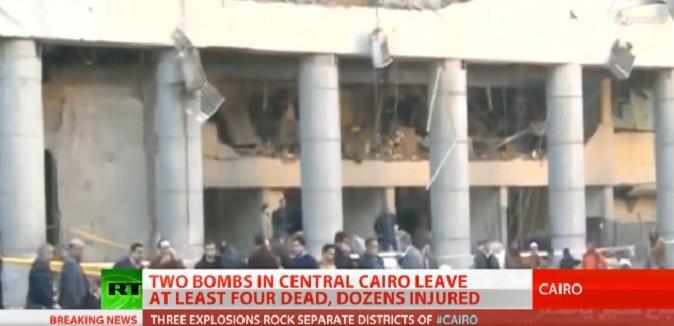At least six people were killed and 70 more were injured last Friday when Islamists launched three attacks against Cairo police stations, including against the city’s main headquarters, and by the end of the day, outside a Giza city movie theater. The attacks were claimed by Ansar Jerusalem, a Sinai-based Al Qaeda-linked jihadist group, and the Long War Journal noted in its analysis of that the group had only hours earlier issued a warning.
The first attack came only a few hours after Ansar Jerusalem had issued an audio warning. In the message, an Ansar Jerusalem official identified as Abu Osama al Masri urged Egyptian security personnel to repent and save themselves. “If you can escape with your weapon then do that. Otherwise, you know that soldiers are dealt with as one bloc. We will target you as we target your leaders,” al Masri said.
The attacks came just before the third anniversary of the protests that forced the country’s former president Hosni Mubarak out of power. On what was supposed to be a day of celebration, officials confirmed that 49 people had been killed in nationwide protests.
Fierce clashes raged in several neighbourhoods across the country, with armoured police vehicles charging at protesters in downtown Cairo. Supporters of Egypt’s ousted Islamist president, Mohamed Morsi, as well as activists opposed to the authoritarianism of both Morsi and Sisi, took part – and 1,079 people were arrested. “This is not the Egypt that we are looking for,” said Ayman Abdelmeguid, a spokesman for the 6 April group, the secular youth movement that organised many of the first protests against Hosni Mubarak in 2011.
An ongoing campaign by the Egyptian army to uproot terrorist infrastructure in the Sinai Peninsula earlier last week succeeded in cornering a key Islamist leader, who was killed in the subsequent gun fight. A referendum setting the contours of a democratic transition for the country passed overwhelmingly in recent weeks, and Egyptian military chief Abdel Fattah al-Sisi – the key figure in the overthrow of the country’s most recent president, Mohammed Morsi, who was pushed aside by the army amid mass anti-government protests – is positioning himself for what is likely to be a glide into the presidency. The instability seems set to deepen ongoing dynamics reconfiguring the region and hardening three regional blocs: an Iranian-anchored Shiite camp, a camp of traditional U.S. allies drawn from the Arab world plus Israel, and an extremist Sunni camp that includes Turkey and the Muslim Brotherhood. Saudi Arabia’s King Abdullah earlier this month emphasized to Secretary of State John Kerry that Egypt is too important to be allowed to collapse into chaos.
[Photo: DailyNews / YouTube ]




